MORGANTOWN — In one of their final chances to pitch their respective message to voters in the first district, Congressional candidates David McKinley and Kendra Fershee didn’t pull any punches.

That didn’t stop them from maintaining a modicum of civility on MetroNews “Talkline” Wednesday morning, with both suggesting the rhetoric across the board needs toning down in the wake of political violence and threats.
On the issues, the two varied sharply — as the incumbent Republican McKinley seeks to maintain his stranglehold on a district that voted Democratic every two years from 1968 to 2008.
McKinley touted his support of President Trump’s tax reform plan along with West Virginia’s ongoing, though uneven, economic recovery as reasons to send him back to Washington D.C. for his fifth term.
“It hasn’t touched everybody, but the confidence level now around this country — and I’m sure (Kendra) has heard this too — they feel better about their future in West Virginia,” McKinley said.
He continued: “Give it time. It’s been in effect 10 months. There’s no argument — or I hope there’s no argument from Kendra or anyone else — that the economy is stronger today than it was. It’s not reached every hill and hollow. Not everybody has benefitted, but some 90 percent of people have probably benefitted one way or the other.”
Fershee, who defeated well-funded Democrat Ralph Baxter in the May primaries, said GDP, unemployment, and other economic data don’t measure the single most important part of an economy.
“The problem is you can look at those economic measures and say they are better across the board,” she said. “It doesn’t mean that families are doing better in West Virginia. That should be the measure of success. And, right now, our measure of success is not anywhere it should be.”

She further criticized the tax cut as irresponsible, citing Senate Majority Leader Mitch McConnel’s recent candid comments on cutting entitlement programs.
“That was apparently an easy choice to make, and the deficit shoots up,” she said. “But as soon we start talking about protecting medicare or universal health care, all of a sudden we can’t afford it. That can’t be, and it needs to be a political priority that we ensure that our population is healthy — especially our elders.”
“And that they have money that they don’t have to eat cat food,” she continued, “which is why FDR created the Social Security system in the first place.”
McKinley said Republicans like him will not support reduction of SSI benefits.
“This is just a scare tactic that comes up every time, every two years in a campaign,” he said. “It hasn’t happened.”
Fershee said she would not support raising the retirement age, but would rather see additional support for the programs through funding. McKinley’s solution: more taxpayers.
“Just imagine if we filled those seven million (jobs) and they are all paying into Social Security, and Medicare, and Medicaid,” he said. ”
He did suggest benefits could be impacted for those in the Millennial generation, but said people currently over the age of 45 are unlikely to see benefit reductions.
Fershee further criticized the budgetary priorities of Congressional Republicans, citing a recent expenditure that dedicates an additional $6 billion across the country towards fighting the opioid epidemic. Compared to the $26 billion that goes annually to HIV/AIDS, Fershee called the expenditure pale in comparison.
“$6 billion won’t scratch the surface,” she said. “We’re fighting a war right now, and we can’t put $6 billion towards a war and expect that we’re going to win it. We could probably spend $6 billion in West Virginia for detox and rehab alone.”
McKinley, to an extent, agreed.
“We can’t do just annual funding,” he said. “We’ve got to have a long-term funding program.”
He also stressed the importance of education to avoid future generations suffering.
The two also sparred on healthcare, with Fershee supporting an expansion of the Affordable Care Act — also known as Obamacare — into a universal program that covers all. McKinley said fixing the current system was more important than making it larger.
“93 percent of folks in this country are covered under one form or another — Medicare, Medicaid, private insurance, veterans, VA,” he said. “When you put all those together, 93 percent are not effected by the Affordable Care Act.”
Fershee countered, citing McKinley’s voting record — which includes dozens of votes to repeal the ACA either partially or in full.
“It only takes one vote to repeal Obamacare,” she said, “that you lose those pre-existing conditions. You don’t need multiple to do it, and obviously it was an unsuccessful effort. Obviously, over time, we’ve learned that people really need those pre-existing condition coverages.”
The WVU Law professor further pointed towards her goal of providing West Virginian’s with what she has previously described as ‘collective freedom’ — the type of economic freedom that entices West Virginians to stay in West Virginia.
“We need to make sure that communities are supported through infrastructure,” Fershee said. “We need to make sure that we have broadband and roads and communities. We need to make sure that people are healthy with universal health care. We need to make sure that kids are being educated in public schools. We can’t tax cut our way into bringing corporations into West Virginia, because they can get tax cuts anywhere.”
She continued: “Our poverty rate is five percent higher than the rest of the country. I talked to people who work full time and can’t afford to put food on their table for their kids even though they are working full time. They have to take government assistance in order to feed their families.”
In their final thoughts, the two made very different pitches. McKinley touted his ability to work across the aisle.
“I’m the sixteenth, out of 435 members of Congress, I’m rated the sixteenth most bi-partisan member of Congress,” he said. “I can work on both sides of the aisle.”
Fershee prodded McKinley though — saying he was too close to the pharmaceutical industry.
“I want to know that our Congressional member is loyal to West Virginians and not to corporate PAC’s, which is why I don’t take corporate PAC money,” she concluded.
See the full interview at the video section of wvmetronews.com.




